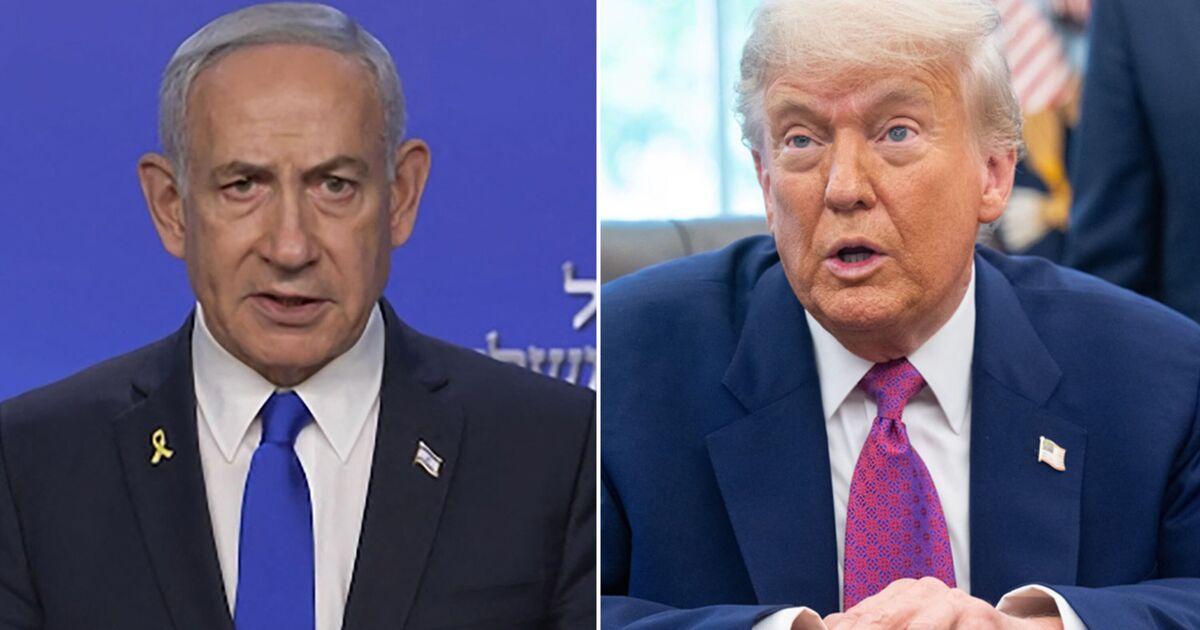

The Middle East is standing on the brink of war as Donald Trump warned Israel could unleash “even more brutal” attacks on Iran. He urged the Iranian regime to sign a deal over its nuclear programme “before there is nothing left”.
The US president’s stark warning came after Israel unleashed a ferocious missile assault on the Islamic State. Operation Rising Lion, involving more than 200 Israeli jets, targeted a nuclear facility in Natanz and the capital Tehran.
The US was told in advance that the raids were coming, but the UK was not given any notice amid rising tensions over Gaza.
Israeli prime minister Benjamin Netanyahu said he had blitzed the heart of Iran's nuclear enrichment programme, which he feared would eventually be aimed at Israel.
Iran promised “severe punishment” for the attacks, which killed several top commanders and nuclear scientists, and launched 100 drones towards Israel in an initial response.
Frantic diplomatic efforts were under way on Friday as world leaders tried to pull both sides back from a terrifying conflict.
Sir Keir Starmer, who was left in the dark over the attacks, urged "restraint".
The Prime Minister convened an emergency Cobra meeting on Friday afternoon, as well as holding diplomatic talks with French president Emmanuel Macron and German chancellor Friedrich Merz.
Mr Netanyahu was expected to speak with Mr Trump and Russian president Vladimir Putin, as well as holding talks with Sir Keir.
Of the call, a Downing Street spokesperson said: “The Prime Minister was clear that Israel has a right to self-defence and set out the UK’s grave concerns about Iran’s nuclear programme.
“He reiterated the need for de-escalation and a diplomatic resolution, in the interests of stability in the region.”
Speaking to Bloomberg News earlier, Sir Keir said he was “very concerned about the situation that is developing” but called on both sides to refrain from further escalation.
He added: “It’s obvious that for a long time, we’ve had grave concerns about the nuclear programme that Iran is putting together and we absolutely recognise Israel’s right to self-defence.”
It is understood British warplanes are not currently involved in helping to defend Israel's skies from any Iranian counterattacks.
This could change as the situation develops.
Additional forces could well be sent to a key Royal Air Force base in Cyprus, where Typhoon jets are stationed.
The deployment of reinforcements to RAF Akrotiri has happened in the past during times of crisis in the Middle East.
The Israeli strikes in the early hours of Friday targeted nuclear facilities, missile factories, and killed Hossein Salami, the leader of Iran’s Islamic Revolutionary Guard Corps.
The attack appeared to be the most significant Iran has faced since its war with Iraq in the 1980s.
The Daily Express understands that the audacious blitz took years of planning and involved Mossad commandos operating deep inside Iran.
Foreign Secretary David Lammy said stability in the Middle East is “vital” for global security.
It is understood that Mr Lammy was due to travel to the US on Friday, but is now remaining in London.
Mr Netanyahu said on Friday that the “operation will continue for as many days as it takes to remove this threat”.
In a clip posted on social media, he said Israel “struck at the heart of Iran’s nuclear enrichment programme” and “the heart of Iran’s nuclear weaponisation programme”.
Iranian state television reported that the leader of the paramilitary Revolutionary Guard, Mr Salami, was killed, as well as chief of staff of the Iranian armed forces, Gen Mohammad Bagheri.
US secretary of state Marco Rubio said Israel acted unilaterally.
Mr Trump said he “gave Iran chance after chance to make a deal” and warned that Israel has “a lot of” US military equipment, and they “know how to use it”.
Posting on his Truth Social site, he wrote: “There has already been great death and destruction, but there is still time to make this slaughter, with the next already planned attacks being even more brutal, come to an end.
“Iran must make a deal, before there is nothing left.”
Shadow Foreign Secretary Dame Priti Patel said: “We must use our influence and diplomacy to work closely with all of our allies in the region and beyond to resolve conflicts, and deliver peace and stability in the Middle East.”
Conservative Party Leader Kemi Badenoch said “warm words” would not stop Iran, and that she did not see Israel’s action as an escalation.
“If Israel sees Iran getting nuclear weapons, I don’t think it should sit back and put its feet up and say ‘Well, we’re de-escalating’.
“Because the person, the country, that will escalate is Iran, and that would be absolutely disastrous for the entire world,” she told journalists in Scotland.
Iran denies that its nuclear program is aimed at building a bomb, a claim that is backed by US intelligence, and Iranian officials had repeatedly refused demands to give up the ability to enrich uranium, which it says it needs to fuel its nuclear power program, but which could also be used to build a nuclear weapon.
A 2015 agreement between Tehran, the US and other permanent members of the UN Security Council had imposed strict limits on Iranian nuclear program activities and enrichment in exchange for sanctions relief.